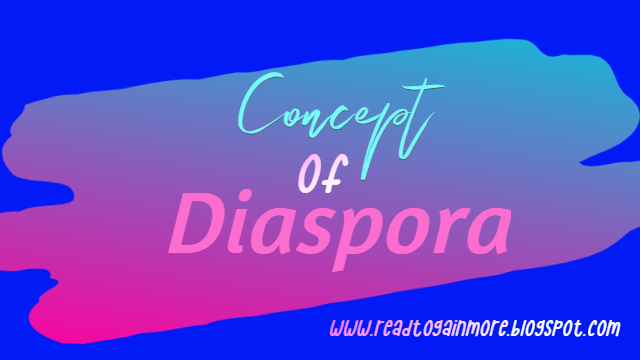Diaspora
The Concept of 'diaspora' goes back to human history. The term was initially used by the ancient Greeks to describe their spreading all over the then known world. But, the term traditionally refers to the Jewish community. As Oxford Advanced Learner's Dictionary (7th edition) defines. " Diaspora is the movement of the Jewish people away from their own scattered after Babylonian Captivity and in the modern period to Jews leaving outside of Palestine and now Israel. For them, the concept of diaspora implies a traumatic exile from historical homelands and dispersal throughout many lands. They try to create cultural forms of their own. The concept of forming their own culture in an alien land is a special future of diaspora.
Irrespective of its traditional meaning, in recent times the term is associated with colonial experience. When we examine Asheron, Griffins, and Tiffin, they believe that diaspora can not be departed from colonialism, as it was this historical condition that led to the displacement of people across the world. Ash croft views "colonialism itself is a diaspore movement". Under colonialism, the meaning of diaspora has been extended to cover a range of different cultural and ethnic groups held together by shared cultural or religious commitments and having some sense of 'exile' from a place of state of original belonging.
Diaspora has been used in the studies of race and ethnicity to describe a range of cultural affiliations connecting the groups dispersed voluntarily or involuntarily across national borders.
As we know identity is inextricably bound with the notion of location and the expression of culture is also inextricably bound up with the notion of identity. When people migrate to another country they are cut off from their own culture, They feel a kind of loneliness. These lone lines in the foreign country are a diasporic feeling. They become homeless. They lose their previous identity in their new land. They find a loss of 'self.' They become rootless. They try to search for their identity. They come emigrants, expatriates and they are always haunted by some 'sense of loss'. So some writers express their identity by writing. The feeling of being culturally alienated creates problems in making the identity.
"We know who we are only when we know who we are not". This feeling is more powerful to expatriates. They know the real meaning of the above statement. Thus, the diaspora is the feel of the loss of origin and a loss of home or being in the state of homelessness or rootlessness. Diasporic experience is a common feature of human civilization. Diaspora is more or less related to alienation, displacement, dislocation, exile, etc. All these terms are related to the state of homelessness.
In the present world scenario, the migrants or exiles are trying to recreate their identity and make their identity located through writing. They express their traumas of being exiled and diasporic in their writings. The feeling of homelessness in a foreign country is not only a haunting factor but also a source of strength. They get a kind of inner power to write something for their identity. Their writings or creations create a home for the writers. There are many expatriate writers Who have written many books, or articles to establish their identity in the new places. Their home gets recreated through writing. Writing becomes a place to live in. The idea of a safe home is a mental, not of physical reality to the people in the diaspora. Home is, therefore, only a matter of speculation.



Post a Comment
Please do not enter any spam link in the comment box.